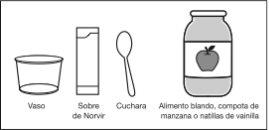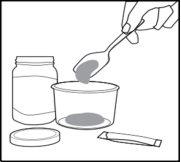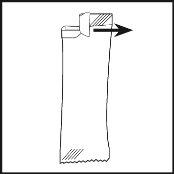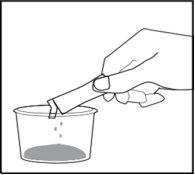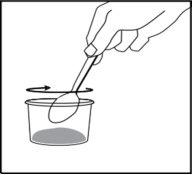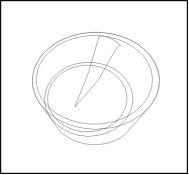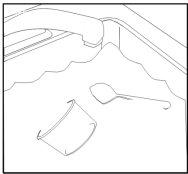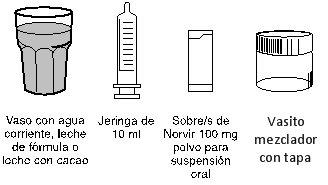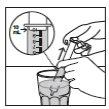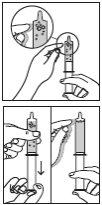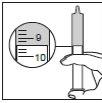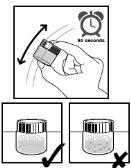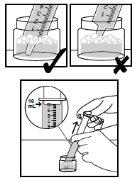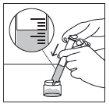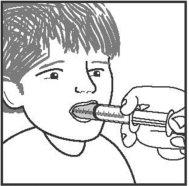
NORVIR 100MG POLVO PARA SUSPENSION ORAL
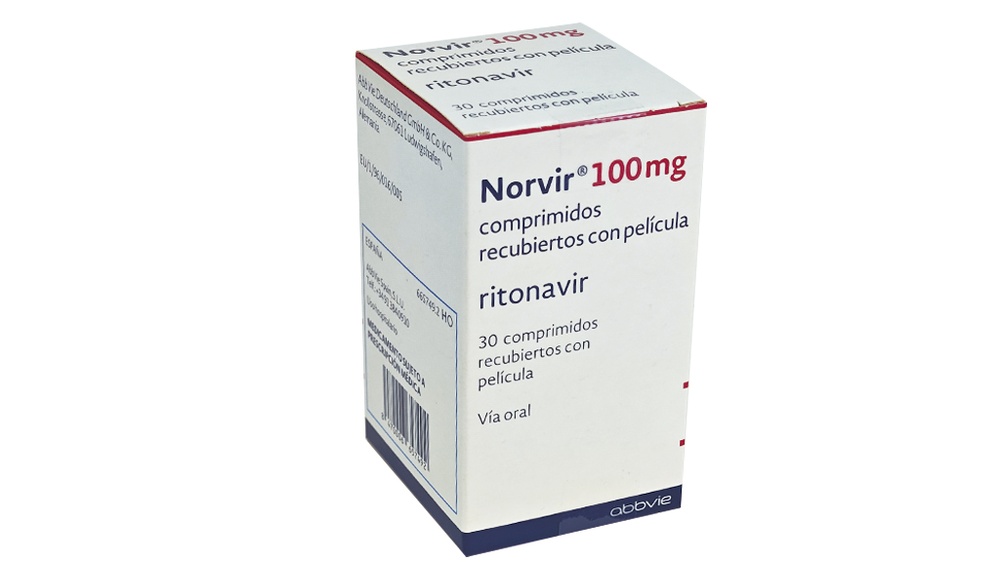

Cómo usar NORVIR 100MG POLVO PARA SUSPENSION ORAL
Traducción generada por IA
Este contenido ha sido traducido automáticamente y se ofrece solo con fines informativos. No sustituye la consulta con un profesional sanitario.
Ver originalContenido del prospecto
Introducción
Prospecto: Información para el usuario
Norvir 100 mg polvo para suspensión oral
ritonavir
Lea todo el prospecto detenidamente antes de empezar a tomar este medicamento, porque contiene información importante para usted o para su hijo.
- Conserve este prospecto, ya que puede tener que volver a leerlo.
- Si tiene alguna duda, consulte a su médico o farmacéutico.
- Este medicamento se le ha recetado solamente a usted y no debe dárselo a otras personas, aunque tengan los mismos síntomas que usted, ya que puede perjudicarles.
- Si experimenta efectos adversos, consulte a su médico o farmacéutico, incluso si se trata de efectos adversos que no aparecen en este prospecto.Ver sección 4.
Contenido del prospecto:
- Qué es Norvir y para qué se utiliza
- Qué necesita saber antes de que usted o su hijo tome Norvir
- Cómo tomar Norvir
- Posibles efectos adversos
- Conservación de Norvir
- Contenido del envase e información adicional
1. Qué es Norvir y para qué se utiliza
Norvir contiene la sustancia activa ritonavir. Norvir es un inhibidor de la proteasa usada para controlar la infección por el VIH. Norvir se utiliza en combinación con otros medicamentos anti-VIH (antirretrovirales) para controlar la infección por el VIH. Su médico hablará con usted para indicarle cual es la mejor combinación de medicamentos para usted.
Norvir se utiliza en niños a partir de 2 años de edad, en adolescentes y adultos infectados con el VIH, el virus causante del SIDA.
2. Qué necesita saber antes de que usted o su hijo tome Norvir
No tome Norvir
- si es alérgico a ritonavir o a cualquiera de los demás componentes de Norvir (ver sección 6).
- si padece una enfermedad grave de hígado.
- si está tomando actualmente alguno de los siguientes medicamentos:
- astemizol o terfenadina (utilizados normalmente para tratar los síntomas de alergia – estos medicamentos pueden adquirirse sin receta médica);
- amiodarona, bepridil, dronedarona, encainida, flecainida, propafenona, quinidina (utilizados para corregir latidos cardíacos irregulares);
- dihidroergotamina, ergotamina (utilizados para tratar dolores de cabeza producidos por migrañas);
- ergonovina, metilergonovina (utilizados para parar las hemorragias que pueden producirse después del parto o de un aborto);
- clorazepato, diazepam, estazolam, flurazepam, triazolam o midazolam oral (que se toma por la boca) (utilizados para ayudarle a dormir y/o aliviar la ansiedad);
- clozapina, pimozida, (utilizados para tratar pensamientos o sentimientos anormales);
- quetiapina (utilizado para tratar la esquizofrenia, el trastorno bipolar y el trastorno depresivo mayor);
- lurasidona (utilizado para tratar la depresión);
- ranolazina (utilizado para tratar el dolor crónico en el pecho [angina de pecho]);
- petidina, piroxicam, propoxifeno (utilizados para aliviar el dolor);
- cisaprida (utilizada para aliviar ciertos dolores de estómago);
- rifabutina (utilizada para prevenir/tratar ciertas infecciones)*;
- voriconazol (utilizado para tratar infecciones producidas por hongos)*;
- simvastatina, lovastatina (utilizados para reducir el colesterol en sangre);
- neratinib (utilizado para tratar el cáncer de mama);
- lomitapida (utilizado para reducir el colesterol en sangre);
- alfuzosina (utilizado para tratar el aumento del tamaño de la próstata);
- ácido fusídico (utilizado para tratar infecciones bacterianas);
- sildenafilo si padece una enfermedad pulmonar llamada hipertensión arterial pulmonar que dificulta la respiración. Los pacientes sin esta enfermedad pueden usar sildenafilo para la impotencia (disfunción eréctil) bajo la supervisión de su médico (ver sección Uso de Norvir con otros medicamentos);
- avanafilo o vardenafilo (utilizado para tratar la impotencia);
- colchicina (usada para tratar la gota) si tiene problemas de hígado y/o riñón (ver sección Uso de Norvir con otros medicamentos);
- productos que contienen hierba de San Juan (Hypericum perforatum) ya que puede ocasionar que Norvir deje de actuar adecuadamente. La hierba de San Juan se usa a menudo en medicamentos a base de plantas que puede comprar usted mismo.
*Su médico puede decidir que tome rifabutina y/o voriconazol con una dosis de refuerzo (dosis menor) de Norvir pero una dosis completa de Norvir no debe tomarse junto con estos dos medicamentos.
Si actualmente está tomando alguno de estos medicamentos, pregunte a su médico si podría cambiar la medicación mientras toma Norvir.
Para el uso de otros medicamentos que requieren cuidado especial consulte el listado incluido en la sección “Toma de Norvir con otros medicamentos”
Advertencias y precauciones
Consulte a su médico antes de empezar a tomar Norvir.
Información importante
- Si toma Norvir junto con otros medicamentos antirretrovirales, es importante que usted lea detenidamente los prospectos de estos otros medicamentos. En estos prospectos puede encontrar información adicional importante sobre las situaciones en las que debería evitar tomar Norvir. Si tiene más preguntas acerca de Norvir (ritonavir) o del resto de medicamentos que le han recetado, consulte a su médico o farmacéutico.
- Norvir no cura la infección por el VIH o SIDA
- Las personas que toman Norvir pueden seguir desarrollando infecciones u otras enfermedades relacionadas con la infección por VIH o SIDA. Es por tanto importante que permanezca bajo la supervisión de su médico mientras tome Norvir.
- A pesar de que un tratamiento antirretroviral efectivo reduzca el riesgo de transmisión, mientras esté tomando este medicamento aún puede transmitir el VIH a los demás. Consulte a su médico sobre qué precauciones son necesarias para evitar infectar a otras personas.
Informe a su médico si tiene o ha tenido:
- Antecedentes de enfermedad de hígado.
- Hepatitis B o Cy está siendo tratado con una combinación de medicamentos antirretrovirales, ya que tienen un riesgo mayor de sufrir efectos adversos graves y potencialmente mortales debido al efecto en el hígado. Puede ser necesario que le realicen análisis de sangre para controlar la función del hígado.
- Hemofilia, ya que hay casos de pacientes con hemofilia en tratamiento con este tipo de medicamentos (inhibidores de la proteasa) con aumentos en el sangrado. No se conoce la razón por la que esto sucede. Usted puede necesitar que le administren medicación adicional que facilite la coagulación de la sangre (factor VIII), para controlar cualquier hemorragia.
- Disfunción eréctil,ya que los medicamentos que se usan en el tratamiento de la disfunción eréctil pueden causar hipotensión y erección prolongada.
- Diabetes, ya que hay casos de empeoramiento o de desarrollo de diabetes (diabetes mellitus) en algunos pacientes que toman inhibidores de la proteasa.
- Enfermedad del riñón (renal),ya que su médico puede necesitar comprobar la dosis de otros medicamentos que esté tomando (como los inhibidores de la proteasa).
Informe a su médico si experimenta:
- Diarrea o vómitosque no mejoran (persistentes), ya que puede reducir la eficacia de los medicamentos que está tomando.
- Mareos(náuseas), vómitoso tiene dolor de estómago, ya que estos pueden ser signos de inflamación del páncreas (pancreatitis). Algunos pacientes que estén tomando Norvir, pueden desarrollar problemas en el páncreas. Informe a su médico lo antes posible si éste es su caso.
- Síntomas de infección– informe a su médico inmediatamente. Algunos pacientes con infección por VIH (SIDA) avanzada que comienzan un tratamiento anti-VIH pueden desarrollar los síntomas de infección que han tenido en el pasado incluso si no saben que la han tenido. Se cree que esto ocurre porque la respuesta inmune del cuerpo mejora y ayuda al organismo a luchar contra estas infecciones.
Además de las infecciones oportunistas, puede sufrir también trastornos autoinmunes (un problema que ocurre cuando el sistema inmune ataca el tejido de un cuerpo sano) después de que empiece a tomar medicamentos para el tratamiento de su infección por VIH. Los trastornos autoinmunes pueden aparecer varios meses después del comienzo del tratamiento. Si usted observa cualquier síntoma de infección u otros síntomas como debilidad muscular, debilidad que empieza por las manos y los pies y que va subiendo por el tronco, palpitaciones, temblor o hiperactividad, por favor informe a su médico de inmediato para buscar el tratamiento necesario.
- Rigidez de articulaciones, malestar y dolor(especialmente de cadera, rodilla y hombro) y dificultad de movimientos, informe a su médico, ya que puede ser signo de un problema que puede destruir el hueso (osteonecrosis). Algunos pacientes que toman medicamentos antirretrovirales pueden desarrollar esta enfermedad.
- Dolormuscular, molestias o debilidad, particularmente en combinación con terapia antirretroviral incluyendo inhibidores de la proteasa y análogos de nucleósidos. En raras ocasiones estos desórdenes musculares han sido graves (ver sección 4. Posibles efectos adversos).
- Mareo, aturdimiento, desmayo o latido anómalo.Algunos de los pacientes que están tomando Norvir pueden experimentar cambios en el electrocardiograma (ECG). Informe a su médico si tiene algún problema de corazón o de la conducción eléctrica del corazón.
- Si tiene otros problemas de salud, consulte a su médico tan pronto como le sea posible.
Niños y adolescentes
No se recomienda el uso de Norvir en niños menores de 2 años de edad.
Uso de Norvir con otros medicamentos
Informe a su médico o farmacéutico si está tomando, ha tomado recientemente o podría tener que tomar otros medicamentos, incluso los adquiridos sin receta. Hay algunos medicamentos que no puede utilizar si está tomando Norvir. Estos medicamentos se recogen en la sección 2, bajo el título de “No tome Norvir”. Hay algunos medicamentos que sólo se pueden tomar bajo ciertas circunstancias tal y como se describe más abajo.
Las siguientes precauciones se tomarán cuando se use Norvir a dosis completas. No obstante estas precauciones también pueden ser necesarias cuando se toma Norvir a dosis bajas (de refuerzo) con otros medicamentos.
Informe a su médico si está tomando alguno de los medicamentos indicados abajo, ya que se deben tener precauciones especiales.
- Sildenafilo o tadalafilopara la impotencia (disfunción eréctil). Debe reducir la dosis y/o frecuencia de uso de estos medicamentos para evitar hipotensión y erección prolongada. No debe tomar Norvir con sildenafilo si sufre además hipertensión arterial pulmonar (ver sección 2. Qué necesita saber antes de que usted o su hijo tome Norvir). Informe a su médico si está tomando tadalafilo para el tratamiento de la hipertensión arterial pulmonar.
- Colchicina(para la gota) ya que Norvir puede incrementar los niveles en sangre de este medicamento. Usted no debe tomar Norvir con colchicina si padece problemas de hígado y/o riñón (ver también “No tome Norvir” arriba).
- Digoxina(medicamento para el corazón). Para prevenir problemas de corazón su médico puede necesitar ajustar la dosis de digoxina y monitorizarle mientras esté tomando digoxina y Norvir.
- Anticonceptivos hormonalesque contengan etinil estradiol, ya que Norvir puede reducir la eficacia de estos medicamentos. Se recomienda usar en su lugar un preservativo u otro método anticonceptivo no hormonal. Además puede experimentar sangrado uterino irregular si toma este tipo de anticonceptivos hormonales con Norvir.
- Atorvastatina o rosuvastatina(para el colesterol alto) ya que Norvir puede aumentar los niveles en sangre de estos medicamentos. Informe a su médico antes de tomar medicamentos que reducen el colesterol con Norvir (ver “No tome Norvir” más arriba).
- Esteroides(por ejemplo dexametasona, propionato de fluticasona, prednisolona, triamcinolona), ya que Norvir puede aumentar los niveles en sangre de estos medicamentos, lo cual puede conducir a un síndrome de Cushing (desarrollo de una cara redondeada) y reducir la producción de la hormona cortisol. Su médico puede querer reducir la dosis de esteroides o monitorizar sus efectos adversos más estrechamente.
- Trazodona(medicamento para la depresión) ya que pueden producirse efectos no deseados como náuseas, mareos, presión sanguínea baja y desfallecimiento cuando se toman con Norvir.
- Rifampicina y saquinavir(usados para la tuberculosis y el VIH respectivamente) ya que pueden originar daños graves en el hígado cuando se toman con Norvir.
- Bosentan, riociguat(usado para la hipertensión pulmonar arterial), ya que la cantidad en sangre de este medicamento puede aumentar cuando se toma junto con Norvir.
Hay medicamentos que no deben mezclarse con Norvir porque sus efectos pueden aumentar o disminuir cuando se toman juntos. En algunos casos su médico puede necesitar realizar ciertas pruebas, cambiar la dosis o monitorizarle regularmente. Por este motivo debe informar a su médico si está tomando cualquier medicamento, incluso aquellos que ha comprado usted mismo o productos herbales, aunque es importante mencionar los siguientes:
- anfetaminas o derivados de las anfetaminas;
- antibióticos (ej. eritromicina, claritromicina);
- tratamientos para el cáncer (ej. abemaciclib, afatinib, apalutamida,ceritinib, encorafenib, dasatinib, ibrutinib, nilotinib, venetoclax, vincristina, vinblastina);
- anticoagulantes (ej. rivaroxaban, vorapaxar, warfarina);
- antidepresivos (ej. amitriptilina, desipramina, fluoxetina, imipramina, nefazodona, nortriptilina, paroxetina, sertralina, trazodona);
- antifúngicos (ej. ketoconazol, itraconazol);
- antihistamínicos (ej. loratadina, fexofenadina);
- medicamentos antirretrovirales incluyendo inhibidores de la proteasa del VIH (amprenavir, atazanavir, darunavir, fosamprenavir, indinavir, nelfinavir, saquinavir, tipranavir), e inhibidores no nucleosídicos de la transcriptasa inversa (INNTI) (delavirdina, efavirenz, neviparina) y otros (didanosina, maraviroc, raltegravir, zidovudina);
- medicamentos para la turbeculosis (bedaquilina y delamanida);
- medicamentos antivirales empleados para el tratamiento de la infección crónica por el virus de la hepatitis C (VHC) en adultos (ej. glecaprevir/pibrentasvir y simeprevir);
- medicamentos para la ansiedad, buspirona;
- medicamentos para el asma, teofilina, salmeterol;
- atovacuona, medicamento utilizado para tratar ciertos tipos de pneumonía y malaria;
- buprenorfina, medicamento utilizado para el dolor crónico;
- bupropión, medicamento utilizado para dejar de fumar;
- medicamentos para la epilepsia (ej. carbamazepina, divalproex , lamotrigina, fenitoína);
- medicamentos para el corazón (ej. digoxina, disopiramida, mexiletina y antagonistas de los canales del calcio tales como amlodipino, diltiazem y nifedipino);
- medicamentos que afectan al sistema inmunitario (ej. ciclosporina, tacrólimus, everolimus);
- levotiroxina (usado para tratar problemas de tiroides);
- morfina y derivados de la morfina usados para tratar dolores graves (metadona, fentanilo);
- pastillas para dormir (ej. alprazolam, zolpidem) y además midazolam administrado mediante inyección);
- tranquilizantes (ej. haloperidol, risperidona, tioridazina);
- colchicina, tratamiento para la gota.
Hay algunos medicamentos que no puede tomar junto con Norvir. Estos se listan con anterioridad en la sección 2. “No tome Norvir”.
Toma de Norvir con alimentos y bebidas
Ver sección 3.
Embarazo y lactancia
Es muy importante que consulte a su médico si piensa que está embaraza o está planeando quedarse embarazada.
Hay una gran cantidad de información sobre el uso de ritonavir (principio activo de Norvir) durante el embarazo. En general, las mujeres embarazadas recibieron dosis bajas (de refuerzo) de ritonavir junto con otros inhibidores de la proteasa después de los tres primeros meses de embarazo. Norvir no parece aumentar el riesgo de desarrollar defectos de nacimiento comparado con la población general.
Norvir puede pasar a la leche materna. Para evitar la transmisión de la infección, las madres con VIH no deben amamantar a sus hijos.
Conducción y uso de máquinas
Novir puede producir mareos. Si experimenta estos efectos no conduzca ni utilice maquinaria.
3. Cómo tomar Norvir
Siga exactamente las instrucciones de administración de este medicamento indicadas por su médico o farmacéutico. Consulte a su médico o farmacéutico si tiene dudas. Tome este medicamento una o dos veces al día, cada día con alimentos.
Para dosis que supongan cantidades exactas de 100 mg (100, 200, 300, 400, 500 o 600 mg), se debe mezclar el contenido de cada sobre con alimento blando (compota de manzana o natillas) o mezclar con una pequeña cantidad de líquido (agua, leche con cacao, leche de fórmula) y consuma por completo la mezcla.
Para dosis menores de 100 mg, o dosis que se encuentren entre cantidades de 100 mg, debe mezclarse todo el contenido del sobre con líquido, y administrar a continuación mediante la jeringa de dosificación oral el volumen en ml adecuado que le haya indicado su médico.
Para la administración a través de un tubo de alimentación, siga las instrucciones de la sección “¿Cómo preparo la dosis correcta de Norvir polvo para suspensión oral mezclada con líquidos?”.
Use agua para mezclar este medicamentoy siga las instrucciones del tubo de alimentación para administrar el medicamento.
Las dosis recomendadas de Norvir son:
- si se utiliza Norvir para potenciar el efecto de otros medicamentos anti-VIH, la dosis normal para adultos es de 1 a 2 sobres una o dos veces al día. Para mayor información sobre las recomendaciones de dosis, incluyendo la relativa a los niños, lea el prospecto de los medicamentos anti-VIH que se tomen en combinación con Norvir.
- si su médico le receta una dosis completa, los adultos pueden comenzar con una dosis de 3 sobres por las mañanas y de 3 sobres 12 h más tarde, que se aumentará de forma gradual durante un periodo de hasta 14 días para alcanzar la dosis completa de 6 sobres dos veces al día. Los niños (2-12 años) empezarán con una dosis menor que ésta y continuarán hasta la máxima dosis permitida para su talla.
Su médico le indicará la dosis apropiada que usted debe tomar.
Debe tomar Norvir todos los días para controlar el VIH, independientemente de que se sienta mejor. Si hay algún efecto secundario que le impida tomar Norvir como le han indicado, comuníqueselo a su médico inmediatamente. Durante los episodios de diarrea su médico puede decidir que necesita un control adicional.
Tenga siempre a mano una cantidad suficiente de Norvir para no quedarse sin nada. Cuando salga de viaje o necesite permanecer un tiempo en el hospital, compruebe que tiene suficiente Norvir hasta que pueda conseguir más.
Norvir polvo para suspensión oral tiene un regusto que tarda en desaparecer. Puede ayudar a aclarar ese sabor, tomar mantequilla de cacahuete, crema de chocolate y avellanas o sirope de grosellas negras inmediatamente después de la administración de la dosis.
Prepare sólo una dosis cada vez utilizando el número correcto de sobres. Cuando mezcle el polvo con alimentos o líquidos, asegúrese de tomar la dosis completa en las dos horas siguientes a su preparación. No debe mezclar Norvir con nada más sin preguntárselo antes al médico o al farmacéutico.
¿Cómo preparo la dosis correcta de Norvir polvo para suspensión oral mezclada con alimentos (sobre completo)?
Siga las instrucciones a continuación:
Figura 1 | Paso 1. Antes de preparar la dosis de Norvir, reúna los utensilios necesarios (ver figura 1). Paso 2. Compruebe en su receta el número de sobres que necesita para su dosis o consulte con su médico o farmacéutico. |
Figura 2 | Paso 3. Ponga una cucharada pequeña de alimento blando (compota de manzana o natillas de vainilla) en un vaso (ver figura 2). |
Figura 3 | Paso 4. Abra el sobre rasgando la parte superior (ver figura 3). |
Figura 4 | Paso 5. Vierta TODO el polvo del sobre encima del alimento (ver Figura 4). |
Figura 5 | Paso 6. Mezclar bien (ver figura 5). |
Paso 7. Sirva el alimento al paciente. | |
Figura 6 | Paso 8. Debe tomarse todo el alimento que se ha servido (ver Figura 6). Si quedan residuos de polvoen el vaso, añada más cucharadas de alimento y sírvalas al paciente. Use dentro de las 2 horas siguientes. |
Figura 7 | Paso 9. Tire el sobre vacío a la basura. Limpie y seque la superficie de preparación de la dosis. Lave inmediatamente la cuchara y el vaso con agua y jabón lavavajillas (ver Figura 7). Aclare y deje secar al aire. |
¿Cómo preparo la dosis correcta de Norvir polvo para suspensión oral mezclada con líquidos?
Siga las instrucciones a continuación:
Figura 1 | ¿Qué necesita? Antes de mezclar la dosis de Norvir, reúna los utensilios que se muestran en la Figura 1. Puede necesitar usar más de un sobre para cada dosis. Compruebe su dosis en la etiqueta de prescripción del envase o consulte a su médico o farmacéutico si no está seguro. Si necesita más de un sobre para su dosis, repita todos los pasos para cada sobre. |
| Uso de la jeringa Lectura de la escala
Compruebe la jeringa antes de cada uso Será necesario utilizar una jeringa nueva si:
|
Figura 2 | Paso 1. Llene de la jeringa
|
Figura 3 | Paso 2. Mueva las burbujas hacia la punta de la jeringa
|
Figura 4 | Paso 3. Mida el líquido
|
Figura 5 | Paso 4. Vacíe la jeringa a.Empuje lentamente el émbolo para vaciar el líquido de la jeringa en el vasito mezclador (ver Figura 5). |
Figura 6 | Paso 5. Vierta el polvo en el vasito
Tenga cuidado para que no caiga polvo fuera del vasito (ver Figura 6). |
Figura 7 | Paso 6. Mezcle el polvo con el líquido
|
Figura 8 | Paso 7. Llene la jeringa
|
Figura 9 | Paso 8. Mueva las burbujas hacia la punta de la jeringa
|
Figura 10 | Paso 9. Mida la dosis
|
Figura 11 | Paso 10. Administre la dosis al paciente
|
Paso 11. ( Si es necesario) Si necesita utilizar más de un sobre, repita el proceso desde el principio. | |
Paso 12. Después de terminar
|
Si toma más Norvir del que debe
Si toma demasiado Norvir puede experimentar adormecimiento, cosquilleo o sensación de hormigueo. Si se da cuenta de que ha tomado más Norvir de lo que debe, póngase en contacto enseguida con su médico o con el Servicio de Urgencias del hospital más cercano.
Si olvidó tomar Norvir
Si ha olvidado tomar una dosis, tómela lo antes posible. Si la hora de la siguiente dosis está próxima, tome sólo una dosis. No tome una dosis doble para compensar las dosis olvidadas.
Si deja de tomar Norvir
Aunque se sienta mejor, no deje de tomar Norvir sin consultar con su médico. Si toma Norvir como le han indicado, tendrá más probabilidades de retrasar el desarrollo de resistencias a este medicamento.
4. Posibles efectos adversos
Durante el tratamiento del VIH puede haber un aumento en el peso y en los niveles de glucosa y lípidos en la sangre. Esto puede estar en parte relacionado con la recuperación de la salud y con el estilo de vida y en el caso de los lípidos en la sangre, algunas veces a los medicamentos para el VIH por sí mismos. Su médico le controlará estos cambios.
Al igual que todos los medicamentos, Norvir puede producir efectos adversos, aunque no todas las personas los sufran. Cuando se utiliza Norvir con otros medicamentos antirretrovirales los efectos adversos también dependen de esos otros medicamentos. Por eso es muy importante que lea atentamente la sección de reacciones adversas del prospecto de estos medicamentos.
Muy frecuentes:pueden afectar a más de 1 de cada 10 personas
|
|
Frecuentes:pueden afectar hasta 1 de cada 10 personas
|
|
Poco frecuentes:pueden afectar hasta 1 de cada 100 personas
|
|
Raros:pueden afectar hasta 1 de cada 1000 personas
|
|
Informe a su médico si se siente mareado (náuseas), está vomitando o tiene dolor de estómago, porque estos pueden ser síntomas de una inflamación del páncreas. Informe también a su médico si experimenta rigidez de las articulaciones, malestar y dolor (especialmente en cadera, rodilla y hombro) y dificultad de movimientos, ya que esto puede ser un signo de osteonecrosis. Ver sección 2. Qué necesita saber antes de que usted o su hijo tome Norvir.
Ha habido casos de aumento de hemorragias en pacientes hemofílicos tipo A y B durante el tratamiento con éste o con otro inhibidor de proteasa. Si esto le sucediera consulte a su médico inmediatamente.
Se ha informado de que pacientes que estaban tomando Norvir han presentado alteraciones de las pruebas de la función hepática, hepatitis (inflamación del hígado) y raras veces ictericia. Algunas personas tenían otra enfermedad o estaban tomando otros medicamentos. Algunas personas con enfermedad hepática o hepatitis pueden haber empeorado.
Se han descrito casos de dolor muscular, molestias o debilidad, particularmente cuando se toman medicamentos para reducir el colesterol en combinación con tratamiento antirretroviral combinado, incluyendo inhibidores de proteasa y análogos de nucleósidos. En raras ocasiones estos trastornos musculares fueron graves (rabdomiólisis). En el caso de dolor muscular de causas desconocidas o continuo, deje de tomar la medicación, póngase en contacto tan pronto como sea posible con su médico o acuda al Servicio de Urgencias del hospital más cercano.
Informe a su médico inmediatamente si después de tomar Norvir experimenta cualquier síntoma que pueda sugerir una reacción alérgica tales como erupción cutánea, ronchas, o dificultades para respirar.
Si considera que alguno de los efectos adversos que sufre es grave o si aprecia cualquier efecto adverso no mencionado en este prospecto, informe a su médico o farmacéutico, acuda a urgencias o, si es urgente, busque inmediatamente ayuda médica.
Comunicación de efectos adversos
Si experimenta cualquier tipo de efecto adverso, consulte a su médico o farmacéutico, incluso si se trata de posibles efectos adversos que no aparecen en este prospecto. También puede comunicarlos directamente a través del Sistema Español de Farmacovigilancia de Medicamentos de Uso Humano: www.notificaRAM.es. Mediante la comunicación de efectos adversos usted puede contribuir a proporcionar más información sobre la seguridad de este medicamento.
5. Conservación de Norvir
Mantener este medicamento fuera de la vista y del alcance de los niños.
No utilice Norvir polvo para suspensión oral después de la fecha de caducidad que aparece en el sobre y en el envase. La fecha de caducidad es el último día del mes que se indica.
Norvir polvo para suspensión solución oral se debe conservar por debajo de 30º C.
Los medicamentos no se deben tirar por los desagües.
Pregunte a su farmacéutico cómo deshacerse de los envases y medicamentos que no necesita. De esta forma ayudará a proteger el medio ambiente.
6. Contenido del envase e información adicional
Composición de Norvir
- El principio activo es ritonavir. Cada sobre de Norvir contiene 100 mg de ritonavir.
- Los demás componentes son: copovidona, sorbitan laurato, sílice coloidal anhidra.
Aspecto del producto y contenido del envase
Norvir polvo para solución oral se presenta en sobres individuales conteniendo 100 mg de ritonavir. Cada envase contiene 30 sobres, 1 vasito mezclador y 2 jeringas dosificadoras para administración oral.
Puede que solamente estén comercializados algunos tamaños de envase.
Norvir también se presenta como comprimidos recubiertos con película que contienen 100 mg de ritonavir.
Titular de la autorización de comercialización y responsable de la fabricación
Titular de la autorización de comercialización
AbbVie Deutschland GmbH & Co. KG, Knollstrasse, 67061 Ludwigshafen, Alemania
Responsable de la fabricación
AbbVie Deutschland GmbH & Co. KG
Knollstrasse
67061 Ludwigshafen,
Alemania
AbbVie Logistics B.V.,
Zuiderzeelaan 53,
8017 JV Zwolle,
Paises Bajos
Pueden solicitar más información respecto a este medicamento dirigiéndose al representante local del titular de la autorización de comercialización.
België/Belgique/Belgien AbbVie SA Tél/Tel: +32 10 477811 | Lietuva AbbVie UAB Tel: +370 5 205 3023 |
???????? ???? ???? ???.: +359 2 90 30 430 | Luxembourg/Luxemburg AbbVie SA Belgique/Belgien Tél/Tel: +32 10 477811 |
Ceská republika AbbVie s.r.o. Tel: +420 233 098 111 | Magyarország AbbVie Kft. Tel.: +36 1 455 8600 |
Danmark AbbVie A/S Tlf: +45 72 30-20-28 | Malta V.J.Salomone Pharma Limited Tel: +356 22983201 |
Deutschland AbbVie Deutschland GmbH & Co. KG Tel: 00800 222843 33 (gebührenfrei) Tel: +49 (0) 611 / 1720-0 | Nederland AbbVie B.V. Tel: +31 (0)88 322 2843 |
Eesti AbbVie Biopharmaceuticals GmbH Eesti filiaal Tel: +372 623 1011 | Norge AbbVie AS Tlf: +47 67 81 80 00 |
Ελλ?δα AbbVie ΦΑΡΜΑΚΕΥΤΙΚΗ Α.Ε. Τηλ: +30 214 4165 555 | Österreich AbbVie GmbH Tel: +43 1 20589-0 |
España AbbVie Spain, S.L.U. Tel: +34 91 384 09 10 | Polska AbbVie Polska Sp. z o.o. Tel.: +48 22 372 78 00 |
France AbbVie Tél: +33 (0)1 45 60 13 00 | Portugal AbbVie, Lda. Tel: +351 (0)21 1908400 |
Hrvatska AbbVie d.o.o. Tel: +385 (0)1 5625 501 | România AbbVie S.R.L. Tel: +40 21 529 30 35 |
Ireland AbbVie Limited Tel: +353 (0)1 4287900 | Slovenija AbbVie Biofarmacevtska družba d.o.o. Tel: +386 (1)32 08 060 |
Ísland Vistor hf. Tel: +354 535 7000 | Slovenská republika AbbVie s.r.o. Tel: +421 2 5050 0777 |
Italia AbbVie S.r.l. Tel: +39 06 928921 | Suomi/Finland AbbVie Oy Puh/Tel: +358 (0) 10 2411 200 |
Κ?προς Lifepharma (Z.A.M.) Ltd Τηλ: +357 22 34 74 40 | Sverige AbbVie AB Tel: +46 (0)8 684 44 600 |
Latvija AbbVie SIA Tel: +371 67605000 | United Kingdom AbbVie Ltd Tel: +44 (0)1628 561090 |
Este prospecto ha sido revisado en
La información detallada de este medicamento está disponible en la página web de la Agencia Europea del Medicamento http://www.ema.europa.eu
- País de registro
- Principio activo
- Requiere recetaSí
- Fabricante
- Esta información es de carácter general y no sustituye la consulta con un profesional sanitario.
- Alternativas a NORVIR 100MG POLVO PARA SUSPENSION ORALForma farmacéutica: COMPRIMIDO, 100 mgPrincipio activo: RitonavirFabricante: Abbvie Deutschland Gmbh & Co. KgRequiere recetaForma farmacéutica: COMPRIMIDO, 100 mgPrincipio activo: RitonavirFabricante: Accord Healthcare S.L.U.Requiere recetaForma farmacéutica: CAPSULA, 250 mgPrincipio activo: tipranavirFabricante: Boehringer Ingelheim International GmbhRequiere receta
Médicos online para NORVIR 100MG POLVO PARA SUSPENSION ORAL
Comenta la dosis, los posibles efectos secundarios, interacciones, contraindicaciones o la revisión de receta de NORVIR 100MG POLVO PARA SUSPENSION ORAL, sujeto a valoración médica y a la normativa local.
Preguntas frecuentes




